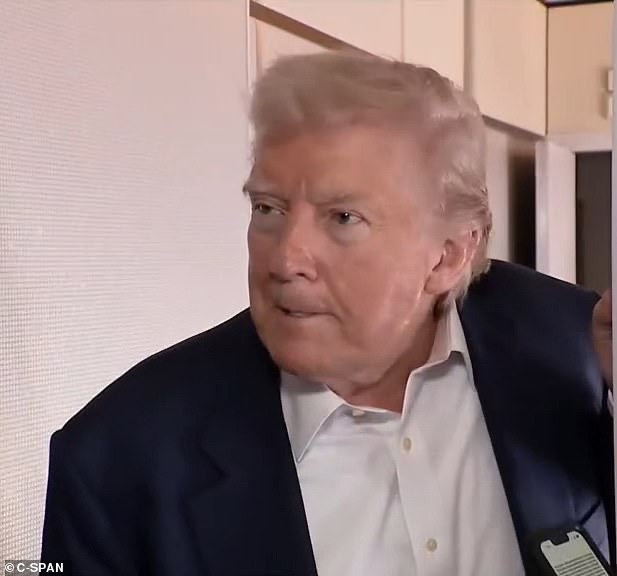Onboard Air Force One, en route to Pope Francis’ funeral, President Donald Trump faced a moment that would quickly ignite controversy. A journalist threw an unexpected question his way: how did he feel about the violent assassination of a Russian general in Moscow earlier that day? Trump’s response—just three words—left many stunned and sparked immediate media frenzy. It wasn’t just what he said; it was what he didn’t say that resonated louder.
Setting the Scene: Air Force One and the Unexpected Question
Trump En Route to Pope Francis’ Funeral
The atmosphere aboard Air Force One that Friday was somber yet procedural. President Trump was heading to Rome to pay respects at Pope Francis’ funeral, a major international event drawing world leaders together. His team was reportedly focused on diplomatic decorum, media optics, and preparing statements for meetings with foreign dignitaries.
Amidst this, domestic and international media traveling with the president stayed busy feeding updates to newsrooms back home. Then, unexpected news broke: a prominent Russian general had been assassinated in a car bomb attack in Moscow—a brazen act even by the chaotic standards of international tensions.
As news of the attack spread among journalists onboard, it became inevitable that Trump would be asked for his take on the explosive development.
The Moment the Question Was Asked
During a media availability session, a journalist raised their voice over the hum of Air Force One’s engines:
“Mr. President, there was a car bomb in Moscow this morning that killed a Russian general. Do you have any reaction to that?”
The question, simple and direct, hung in the air. Cameras were rolling. Reporters leaned in, pens and recorders at the ready. Everyone waited for a presidential response—an empathetic nod, a strong condemnation, a call for calm.
Instead, what they got were three words that reverberated far beyond the press cabin.
The Car Bomb That Shocked Moscow
Who Was General Yaroslav Moskalik?
General Yaroslav Moskalik wasn’t just any figure in the Russian military. He was a key strategist involved in Moscow’s controversial foreign operations and deeply embedded within Russia’s security elite. His death was not merely a personal tragedy but a geopolitical tremor.
Regarded by many analysts as a “hawk” within the Russian Ministry of Defense, Moskalik had been instrumental in several high-stakes international campaigns. His assassination was quickly interpreted as either a major internal power play or a carefully orchestrated act of foreign sabotage.
In either case, his death carried serious implications for Russian politics and security—something global leaders, presumably, would weigh in on with the gravity it deserved.
Details of the Car Bomb Attack
The explosion that claimed Moskalik’s life occurred on a quiet Moscow street early Friday morning. Eyewitnesses described a massive blast that rocked the surrounding area, flipping cars and shattering windows two blocks away.
Authorities quickly labeled it a “terroristic act,” and while no group immediately claimed responsibility, speculation ran rampant: was it a domestic insurgency, a foreign hit, or even an inside job?
Emergency services flooded the scene, and the Kremlin convened an emergency security council meeting. Moscow was on edge, and the international community was waiting to see how major players—like the U.S.—would respond.
Trump’s Three-Word Response
His Exact Words and Their Immediate Impact
When faced with the journalist’s urgent question, Trump blinked, shrugged slightly, and said:
“Is that so?”
Three words. No expression of concern. No condemnation of violence. No condolences to a grieving nation. Just a nonchalant acknowledgment, as if he’d been told the weather forecast rather than news of a political assassination.
The reaction onboard was palpable. Reporters exchanged stunned glances. Within minutes, headlines began to flash: “Trump Shrugs Off Russian General’s Murder”, “Three Words That Echo Worldwide”, and “Trump’s Indifference Sparks Outrage”.
Interpreting Trump’s Reaction
Some observers suggested that Trump’s seemingly detached response indicated he genuinely hadn’t been briefed yet—a failure of communication by his staff. Others believed it reflected his long-standing approach to Russia: calculated, ambivalent, and sometimes oddly sympathetic.
Whatever the reason, the damage was done. In the high-stakes world of international relations, words—or the lack thereof—matter deeply.
Media and Public Backlash
Critics Slam Trump’s Indifference
The backlash was swift and fierce. Major newspapers and TV networks decried Trump’s reaction as “shockingly inappropriate,” “unpresidential,” and “deeply troubling.
Critics argued that even a basic statement of sympathy for civilian casualties—or a condemnation of terrorism—would have been standard presidential protocol.
Pundits across the political spectrum pointed out that Trump’s response could be interpreted by Russia and other adversaries as either approval or dangerous indifference. And in a world teetering on geopolitical instability, perception is often as critical as policy.
Supporters Defend the President’s Reaction
Predictably, Trump’s loyal base came to his defense. Supporters on social media argued that it was smart for Trump not to rush into a reaction without full information.
Some even praised his restraint, saying that “jumping to conclusions” would have been irresponsible given the limited facts available at the moment.
Trump’s defenders framed the media outrage as yet another example of “fake news hysteria,” while critics saw it as yet another alarming sign of a president out of step with global realities.



